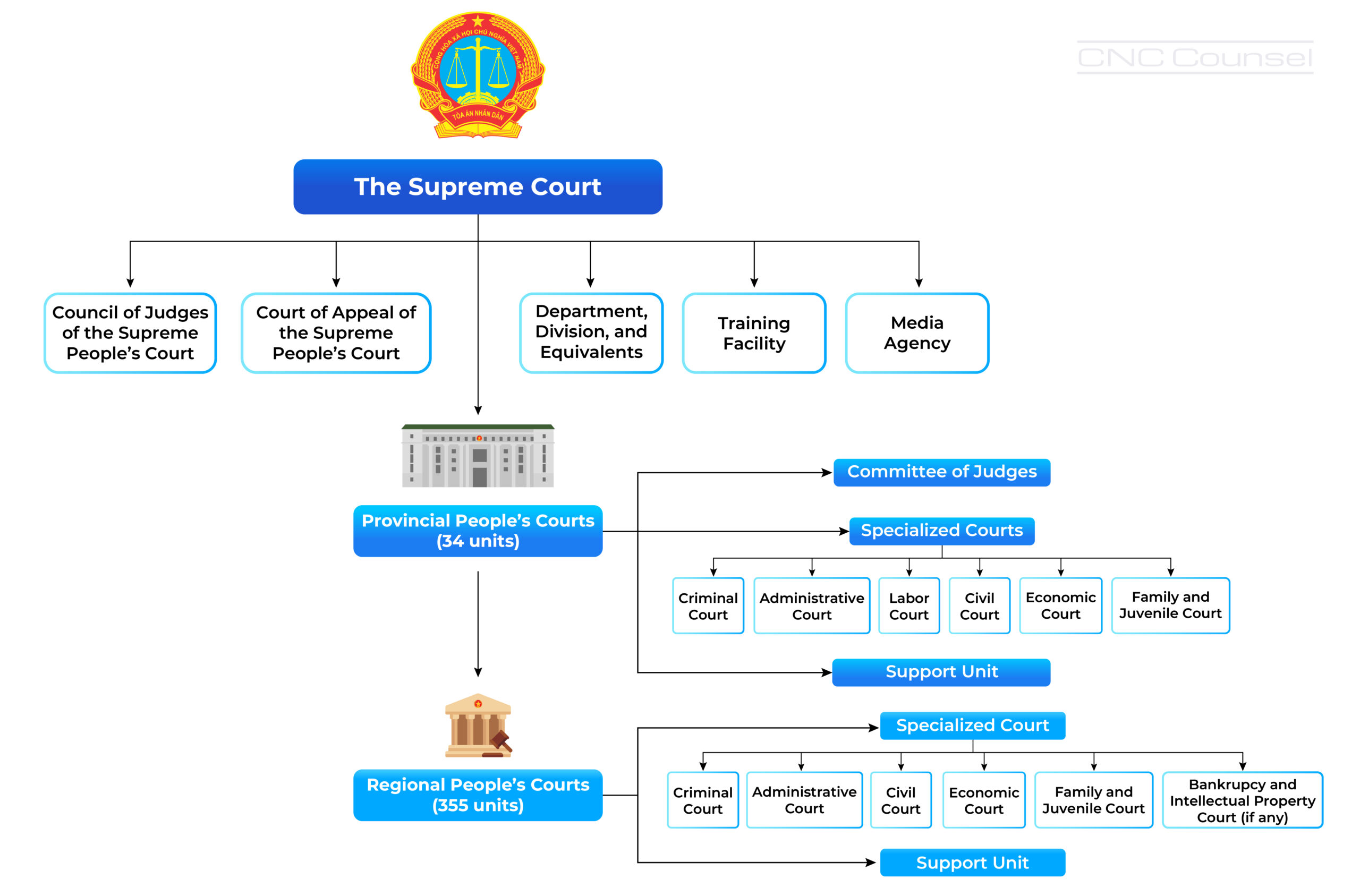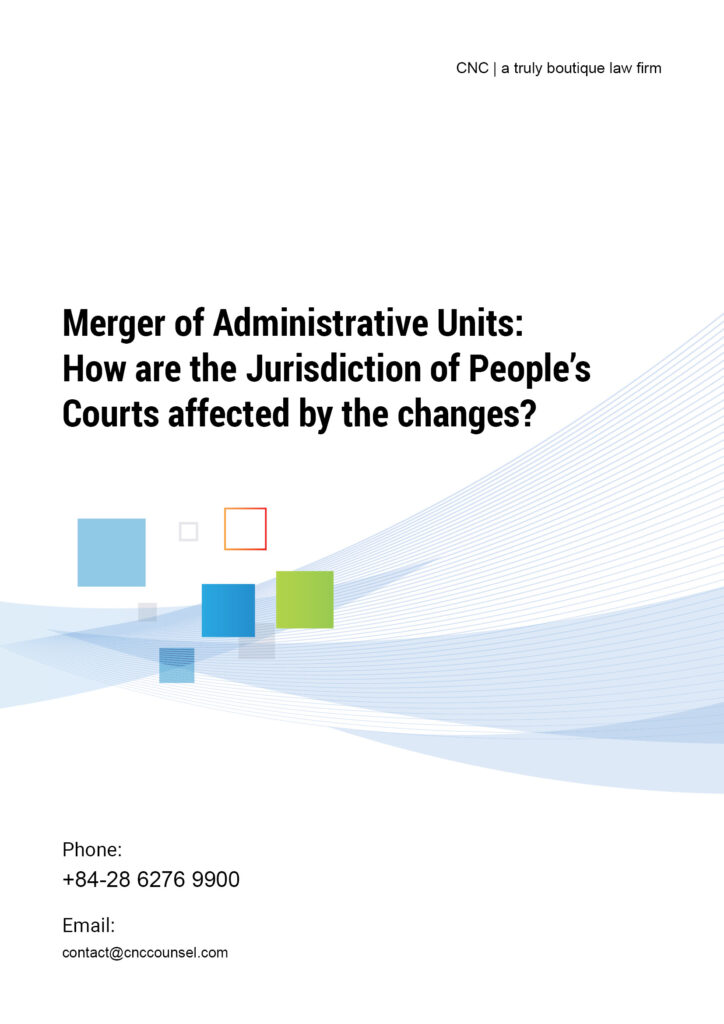Merger of Administrative Units: How are the Jurisdiction of People’s Courts affected by the changes?
2025 marks a monumental event in the rearrangement of administrative units when the number of provinces and municipalities has been significantly reduced from 63 to 34. Concurrently, the system of People’s Courts also undergoes a complete overhaul, with the establishment of 34 Provincial People’s Courts and 355 Regional People’s Courts to replace the previous model of District Courts.
These changes would not only impact the organizational structure of People’s Courts but also the allocation of jurisdiction among the levels of Court. Especially, the jurisdiction of regional courts has been expanded exponentially, while the roles and functions of provincial courts has been adjusted to adapt to the new organizational structure.
The new hierarchal structure of People’s Courts
On 24/06/2025, the National Assembly passed Law No. 81/2025/QH15 on the changes to the Law on Organization of People’s Courts No. 24/2024/QH15 (“Amended Law on Organization of People’s Court”). Based on the Amended Law on Organization of People’s Court, on 25/06/2025, the Standing Committee of the National Assembly promulgated Resolution No. 81/2025/UBTVQH15 on the establishment of Provincial People’s Courts and Regional People’s Courts and scope of the jurisdictions of Regional People’s Courts and Provincial People’s Courts based on territory. (“Resolution No. 81”)
Accordingly, as of 01/07/2025, the system of People’s Courts in Vietnam shall be transformed from the 4-level model to the 3-level model, which include:
- Supreme People’s Court is the highest adjudicative body in Socialist Republic of Vietnam, with the power over the cassation and retrial of judgments and decisions of lower courts, supervision of the other Court’s adjudicative works, as well as other special tasks.
Particularly, according to the Amended Law on Organization of the People’s Courts, in addition to the previously held power and responsibilities, the Supreme People’s Court also assume the function of conducting appellate trial for criminal cases in which the decisions and/or judgments of the Provincial People’s Courts are appealed while they are yet to take effect in accordance with the law. This is a completely new function, serving the purpose of adapting to the new 3-level People’s Court organizational model.
- Provincial People’s Courts has been reorganized corresponding to the 34 provinces and municipalities subsequent to the merger, which consists of 19 Provincial People’s Courts, 04 Municipal People’s Courts, and 11 unchanged People’s Court.
Accordingly, Provincial People’s Court has the jurisdiction over the first-instance trial of serious and complex criminal cases[1], and appellate trial for cases in which the decisions and/or judgments of the Regional People’s Courts are appealed while they are yet to take effect in accordance with the law. Additionally, Provincial People’s Court now also have the power over the cassation and retrial of effective decisions and judgments of Regional People’s Court that were protested.
- Regional People’s Courts numbered in are established in all over the country, serving as the replacement for the previous district courts. These are the courts with the most expansive first-instance jurisdiction over civil, administrative, economic, labor, and family and marriage cases, as well as some criminal cases[2].
Notably, the High People’s Courts have ceased their operation according to the new regulation. The purpose of this is to streamline the system while increase the performance of the remaining People’s Courts.
Furthermore, the system of People’s Court subsequent to the merger would also include specialized courts such as Military Court and Specialized Court at international financial center.

Hierarchal structure of People’s Courts subsequent to the merger
Jurisdictions based on case-by-case
Jurisdictions of People’s Court in civil cases
General cases
According to Civil Procedure Code 2015, Provincial People’s Courts have jurisdiction over: (i) first-instance procedures for the resolution of civil, marriage and family, business, commercial, and labor disputes not covered by the jurisdiction of the district court
Moreover, although some cases are under the jurisdictions of district courts, however, in cases it is considered necessary or there are requests from district courts, Provincial People’s Courts have the power to takeover the resolution of the case[3].
Conversely, according to the new regulations in the amended Civil Procedure Code, Provincial People’s Courts only have the adjudicative power over the setting aside of arbitral awards and the registration of ad hoc arbitral awards, and it is limited to 3 specific Courts, namely, the People’s Court of Hanoi, People’s Court of Da Nang, and People’s Court of Ho Chi Minh City
Regarding the jurisdictions over first-instance trial of civil, marriage and family, business, commercial, and labor disputes and resolution of civil, marriage and family, business, commercial, and labor requests which were previously held by the Provincial Courts as provided in Civil Procedure Code 2015, these shall now be assumed by the Regional People’s Court[4] according to the new regulations.
From the above, it is apparent that that, regarding the jurisdiction based on case-by-case, currently, the jurisdictions of the Regional People’s Courts are significantly more expansive in comparison to the late District People’s Courts. Among which, the most noteworthy is that the Regional People’s Court now have jurisdiction over the first-instance trial of all civil, marriage and family, business, commercial, and labor disputes.
Special cases
(i) Regarding arbitration activities
According to the regulations of the Civil Procedure Courts 2015 and Law on Arbitration 2010, the Provincial People’s Courts have the jurisdiction over arbitration activities, particularly, Article 7 of the Law on Commercial Arbitration provides that Provincial People’s Courts have jurisdiction over the recognition and enforcement of foreign arbitral award.[5]
However, according to the amendments and supplements to the Civil Procedure Code and Law on Commercial Arbitration, only the Provincial People’s Courts, specifically the People’s Court of Hanoi, People’s Court of Da Nang, and People’s Court of Ho Chi Minh City, have the jurisdiction over the resolution of request for setting aside arbitral awards or registration of ad hoc arbitral awards[6]. Regarding jurisdictions over other arbitration activities, these are now assumed by the Regional People’s Courts[7].
| Request | Prior to the changes | Subsequent to the changes | ||
| Provincial People’s Court | District People’s Courts | Provincial People’s Court | Regional People’s Court | |
| Appointment of Arbitrator for the constitution of ad hoc Tribunal | ✅ | ✅ | ||
| Replacement of Arbitrators in the ad hoc Tribunal | ✅ | ✅ | ||
| Resolution of claims against the decision of the Tribunal on the arbitration agreement being annulled or impracticable, or on the jurisdiction of the Arbitral Tribunal | ✅ | ✅ | ||
| Collection of Evidence | ✅ | ✅ | ||
| Application of Emergency Interim Measures | ✅ | ✅ | ||
| Summon of Witnesses | ✅ | ✅ | ||
| Jurisdiction over the resolution of requests related to arbitration activities | ✅ | ✅ | ||
| Recognition and enforcement of foreign arbitral award in Vietnam | ✅ | ✅ | ||
Jurisdiction over the resolution of requests related to arbitration activities
(ii) Regarding bankruptcy cases
The jurisdiction over bankruptcy cases of the People’s Court is another issue worthy of attention in the determination of jurisdiction of People’s Court after 01/07/2025. According to Article 4.2 Resolution 81, the Regional People’ Courts have the jurisdiction over the resolution of bankruptcy cases. However, in all 34 provinces/municipalities subsequent to the merger, there are currently only 03 (three) Regional People’s Court with jurisdiction over bankruptcy cases, which are:
| Regional People’s Court with jurisdiction over the resolution of bankruptcy cases | Phạm vi thẩm quyền theo lãnh thổ |
| People’s Court of Zone 2 – Hanoi | Ha Noi City, Hai Phong City; Provinces: Bac Ninh, Cao Bang, Dien Bien, Ha Tinh, Hung Yen, Lai Chau, Lang Son, Lao Cai, Nghe An, Ninh Binh, Phu Tho, Quang Ninh, Son La, Thai Nguyen, Thanh Hoa and Tuyen Quang. |
| People’s Court of Zone 1 – Da Nang | Da Nang City, Hue City; Provinces: Dak Lak, Gia Lai, Khanh Hoa, Quang Ngai, and Quang Tri |
| People’s Court of Zone 1 – Ho Chi Minh City | Can Tho City, Ho Chi Minh City; Provinces: An Giang, Ca Mau, Dong Nai, Dong Thap, Lam Dong, Tay Ninh, and Vinh Long |
Jurisdiction over bankruptcy cases
(iii) Regarding civil, business, commercial petitions and administrative disputes pertaining to intellectual property and transfer of technology.
Similar to bankruptcy cases, intellectual property and transfer of technology petitions in civil, business, and commercial sector and administrative disputes pertaining to intellectual property and transfer of technology are also issues that warrant attention.
According to the current regulation, the above cases are under the adjudicative jurisdiction of only 02 (two) Region People’s Courts, which are the People’s Court of Zone 2 – Hanoi and People’s Court of Zone 1 – Ho Chi Minh City. To be specific:
| Regional People’s Court with the jurisdiction over the resolution of civil, business, commercial petitions and administrative disputes pertaining to intellectual property and transfer of technology | Scope of jurisdiction based on territory |
| People’s Court of Zone 2 – Hanoi | Hanoi City, Hai Phong City, Hue City; Provinces: Bac Ninh, Cao Bang, Dien Bien, Ha Tinh, Hung Yen, Lai Chau, Lang Son, Lao Cai, Nghe An, Ninh Binh, Phu Tho, Quang Ninh, Quang Tri, Son La, Thai Nguyen, Thanh Hoa, and Tuyen Quang. |
| People’s Court of Zone 1 – Ho Chi Minh City | Can Tho City, Da Nang City, Ho Chi Minh City; Provinces: An Giang, Ca Mau, Dak Lak, Dong Nai, Dong Thap, Gia Lai, Khanh Hoa, Lam Dong, Quang Ngai, Tay Ninh, and Vinh Long |
Therefore, in the above special cases, meticulousness and extra caution are advised in the determination of the competent People’s Court.
People’s Court jurisdiction in Criminal cases based on case-by-case
Law on the amendment and supplements to the Criminal Procedure Code No. 99/2025/QH15 provides in details the jurisdiction of People’s Courts of all levels based on criteria such as case nature, territorial factor, and international element (for example: Article 268, 269, Amended Criminal Procedure Code). The clear separation of the jurisdictions ensure that all cases would be resolved by the most appropriate and competent People’s Court, thereby increasing the effectiveness of the trials and mitigating the risks of judgment being repealed or revised due to incorrect jurisdiction

Criteria for the separation of the People’s Courts jurisdiction in Criminal Litigation
Regarding the case nature, according to the new regulations, the Regional People’s Courts have the jurisdiction over the first-instance trial of criminal cases where less serious crime, serious crime, very serious crime, and extremely serious crime have the maximum sentence prescribed by the Criminal Code of up to 20 years.
Other criminal cases not falling under the jurisdiction of the Regional People’s Courts or even those falling under said jurisdiction but laced with complexity, have relation to multiple levels and sectors, have impact on domestic and foreign affairs, or the criminal is a key officer,… shall be under the first-instance jurisdiction of the Provincial’s People Court[8].
Based on the territorial factors, the People’s Court with adjudicative jurisdictions over criminal cases is the Court where the crime is committed. In the event that the crime is committed in multiple places or the place where the crime is committed could not be determined, the Court with the adjudicative power is the Court where the investigation concluded.
Furthermore, according to clause 2, Article 269, Criminal Procedure Code 2015, amended and supplemented in 2025, the adjudicative jurisdiction based on territory in the event that the defendant committed crime in foreign countries/territories and tried in Vietnam, shall belong to the Court where the defendant last resided. If the last residence of the defendant in Vietnam could not be determined, depending on the circumstances of each case, the Chief Justice of the Supreme People’s Court shall issue a decision on the assignment the case to the People’s Court of Hanoi, People’s Court of Ho Chi Minh, People’s Court of Hanoi or a Regional People’s Court under the aforementioned courts.
Jurisdiction based on the level of trials
Based on the 3-level People’s Court organizational model, the Amended Law on Organization of People’s Court and the Law on the amendments and supplements to the Civil Procedure Code, Law on Administrative Procedures have stipulated the jurisdiction of the Regional People’s Court, the Provincial People’s Court, the Supreme People’s Court in a manner that increase the jurisdiction of the Regional People’s Court and the Provincial People’s Court, to be specific:
Regarding Courts with jurisdiction over first-instance procedures
Regional People’s Courts have the jurisdiction over the first-instance procedures for:
- Disputes specified in Articles 26, 28. 30, and 32 Amended Civil Procedure Code and petitions specified in Articles 27, 29, 31, and 33 Amended Civil Procedure Code;
- All of the administrative cases under the adjudicative jurisdiction of the People’s Court.
- Criminal cases where less serious crime, serious crime, very serious crime, and extremely serious crime have the maximum sentence prescribed by the Criminal Code of up to 20 years.
Provincial People’s Courts have the jurisdiction over the first-instance procedures for:
- Criminal cases on crime not under the jurisdiction of the Regional People’s Court;
- Criminal cases under the jurisdiction of the Regional People’s Court but laced with complexity, have relation to multiple levels and sectors, or gathered significant attention from the public, case whose resolution would have impact on domestic and foreign affairs, cases in which the criminal is a key leading officer of provincial level or above, or a religious dignitary, or a person of prestige in ethnic minorities.
Regarding Courts with jurisdiction over appellate procedures
Provincial People’s Courts have the jurisdiction over the appellate procedures for:
- Civil cases in which the judgment or decision of the Regional People’s Court is appealed and/or protested while it has yet to take effect;
- Criminal cases in which the judgment or decision of the Regional People’s Court is appealed and/or protested while it has yet to take effect;
The Court of Appeal of the Supreme People’s Court has the jurisdiction over the appellate procedures for criminal cases in which the judgment or decision of the Provincial People’s Court is appealed and/or protested while it has yet to take effect.
Regarding Court with jurisdiction over cassation/retrial procedures
The Provincial People’s Court have jurisdiction over the cassation/retrial procedures for effective judgments and/or decisions of Regional People’s Court that are appealed and/or protested.
The Supreme People’s Court have jurisdiction over the cassation/retrial procedures for effective judgments and/or decisions of Courts that are appealed and/or protested
Jurisdiction based on territories
As of 01/07/2025, the territorial jurisdiction of Regional People’s Courts and Provincial People’s Courts shall be in accordance with Resolution No. 81/2025/UBTVQH15. Regional People’s Courts shall have their own scope of territorial jurisdiction that separate them from the late District People’s Court. The establishment of Regional People’s Courts and stipulation of the territorial jurisdiction of Provincial People’s Courts and Regional People’s Courts is part of the judicial reform process, which aims to enhance the performance of the Court system.
To be specific, the territorial jurisdiction of Regional People’s Courts and Provincial People’s Courts shall be determined based on the following factors:
Regional People’s Courts:
The Regional People’s Courts’ scope of territorial jurisdiction is detailed in Resolution No. 81/2025/UBTVQH15. Overall, each Regional People’s Court shall have adjudicative jurisdiction over civil, criminal, administrative cases in a certain geographical area.
See more on the List of Regional People’s Courts Nationwide – as of 01/07/2025 here
Provincial People’s Courts:
The territorial jurisdictions of Provincial People’s Courts are also stipulated in Resolution No. 81/2025/UBTVQH15. These jurisdictions include the resolution of certain types of cases or cases with more complex nature that goes beyond the Regional’s People Courts’ jurisdiction.
For civil cases, the determination of the Court’s territorial jurisdiction is stipulated in clause 1 Article 39, Civil Procedure Code 2015, which fundamentally remain unchanged.
However, for cases where the target of the dispute is real estate, the determination of the competent Regional People’s Court for cases previously accepted by District People’s Courts is specified in clause 2, Article 6, Resolution No. 01/2025/NQ-HDTP of the Council of Judges of the Supreme People’s Court, which reads:
“Regarding civil cases where the dispute target is real estate that have been accepted by District People’s Courts in accordance with point c, clause 1, Article 39, of the Civil Procedure Code. In the event that, subsequent to the reorganization of administrative units, the concerned real estate is no longer located within the territory of the commune-level administrative unit under the territorial jurisdiction of the Regional People’s Court inheriting the responsibility of the concerned District People’s Court, the solution shall be as follows:
- In the event that the late District People’s Court had held the session for checking the handover of, access to, and disclosure of evidence and mediating prior to 01/07/2025, the Regional People’s Court inheriting the responsibility of such Court shall proceed with the case;
- In the event that the late District People’s Court had yet to hold the session for checking the handover of, access to, and disclosure of evidence and mediating, the Regional People’s Court inheriting the responsibility of such Court shall transfer the cases to the Regional People’s Court with the appropriate territorial jurisdiction as specified in Resolution No. 81/2025/UBTVQH15 for resolution[9]”
For criminal cases, in criminal litigation, the territorial jurisdiction of Courts is determined based on the location where the crime is committed. If the crime is committed at multiple locations, or the location could not be determined, the Court where the investigation concluded shall have the adjudicative jurisdiction.
For criminal cases where the defendant committed crime in foreign countries/territories and tried in Vietnam, shall belong to the Court where the defendant last resided. If the last residence of the defendant in Vietnam could not be determined, depending on the circumstances of each case, the Chief Justice of the Supreme People’s Court shall issue a decision on the assignment the case to the People’s Court of Hanoi, People’s Court of Ho Chi Minh, People’s Court of Hanoi or a Regional People’s Court under the aforementioned courts[10].
In summary, the clear provisions of territorial jurisdiction of Regional People’s Courts and Provincial People’s Courts help ensure the equality and transparency in adjudicative activities, thus facilitating better access to justice for citizen.
Contact
For more information, please contact:
CNC Vietnam Law Firm Co., Ltd
Address: The Sun Avenue, 28 Mai Chi Tho, Binh Trung Ward, Ho Chi Minh City, Vietnam
Phone: 028 6276 9900
Hotline: 0916 545 618
Email: contact@cnccounsel.com
Website: cnccounsel
Managed by
 |
Ms. Doan Thi Hong Linh | Partner
Phone: (84) 938 533 393 Email: linh.doan@cnccounsel.com |
 |
Bui Doan Minh Tri | Legal Asssistant
Phone: (84) 28 6276-9900 Email: tri.bui@cnccounsel.com |
Disclaimer:
This article was prepared to be used for the purpose of introducing or informing clients about issues and/or developments of legal perspectives in Vietnam. The information presented in this article does not constitute advice of any kind and may be subject to changes without prior notice.
[1] Article 55.1, Amended Law on Organization of People’s Court; Article 268, Criminal Procedure Code 2015, amended and supplemented in 2021, 2025 (“Amended Criminal Procedure Code”)
[2] Article 35, Amended Civil Procedure Code; Article 268.1, Amended Criminal Procedure Code
[3] Article 37, Civil Procedure Code
[4] Article 37, Amended Civil Procedure Code
[5] 37.1.b, Civil Procedure Code 2015; Article 7, Law on Commercial Arbitration 2010.
[6] Article 7.3, Amended Law on Commercial Arbitration; Article 2, Resolution No. 81; See more on Article 2.2, Resolution 71 on the territorial jurisdiction of People’s Court of Hanoi; People’s Court of Da Nang, and People’s Court of Ho Chi Minh over the setting aside of arbitral awards and registration of ad hoc arbitral awards.
[7]Article 35, Amended Civil Procedure Code
[8] Article 268, Amended Criminal Procedure Code
[9] Clause 2, Article 6, Resolution No. 01/2025/NQ-HDTP dated 27/06/2025 of the Council of Judges of the Supreme People’s Court
[10] Clause 2, Article 269, Criminal Procedure Code 2015, amended and supplemented in 2025




